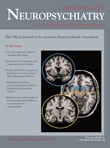Worsened Agitation and Confusion in Schizophrenia Subsequent to High-Dose Aripiprazole
SIR: Aripiprazole is a novel atypical antipsychotic drug with a unique pharmacological profile. 1 Partial agonism of dopamine D 2 , serotonin 5-HT 1A and antagonism of serotonin 5-HT 2A receptors seemed to be the basis of its therapeutical effect. 1 In clinical studies aripiprazole has shown to be effective in the treatment of schizophrenia and bipolar disorders in a dose range of 10–30 mg/day. 1 Among all other antipsychotic drugs, aripiprazole is considered to have the least adverse effects. 1
Recently Duggal et al. published a case report that high-dose aripiprazole treatment improved symptoms in treatment resistant schizophrenia. 2 We report on a schizophrenic patient whose symptoms worsened after a high-dose treatment attempt with aripiprazole.
Case Report
“Mr. L,” a 31-year old patient, with a 14 years history of schizophrenia, was admitted to the hospital with a renewed schizophrenia exacerbation (DSM-IV criteria). He particularly manifested agitation and confusion besides insomnia, paranoid delusions and erratic and absentminded thoughts.
Lastly he had received aripirazole 20 mg/day without entering a stable phase. In order to improve mild ongoing psychotic symptoms the dose of aripiprazole was raised stepwise to 60 mg/day following a case report by Duggal et al. 2 As a consequence of raising aripiprazole dose Mr. L.’s status worsened and hospitalization became necessary. At the time of hospitalization his medication regimen included aripiprazole 60 mg/day. Measurement of serum drug level confirmed an elevated level of 385 ng/ml. Since Mr. L. had initially rejected a reduction of aripiprazole, olanzapine 15 mg/day was added. After 4 weeks of aripiprazole-olanzapine combination no melioration of the situation was reached. Subsequently administered aripiprazole was reduced to 15 mg/day whereas olanzapine treatment (15 mg/day) was continued. Reduction of aripiprazole was accompanied by clear improvement of symptoms during the next 7 days.
Currently, 12 weeks later, our patient is treated with aripiprazole 15 mg/day and olanzapine 10 mg/day and is free of agitation, confusion and other psychotic symptoms.
Comment
Temporal relationship between raising daily aripiprazole dose, symptomatic worsening and improvement with reduction of aripiprazole argues against a natural course of schizophrenia and supports the idea that emergence of symptomatic worsening in the case described is due to high-dose aripiprazole medication.
Worsened agitation and psychotic symptoms with aripiprazole is not a new phenomenon. 3 However, here we depict a case in which the worsening of symptoms appear as a result of increasing aripiprazole dose above the recommended dose of 15 to 30 mg/day. A possible explanation could be that aripiprazole’s agonist effects may enhance dopaminergic neurotransmission, resulting in intensification of psychosis. However, treatment with aripiprazole 30 mg/day induces a dopamine D 2 and D 3 receptor occupancy of almost 95%. 4 Therefore we query that observed effects are induced by an increased dopamine D 2 and D 3 receptor activation. We favor, that worsening symptoms in particular agitation and confusion has been related to an exaggerated serotonin 5HT 1A receptor activation.
Clinicans should notice that high-dose aripiprazole may be associated with worsening psychotic symptoms due to its unique receptor profile. However, in treatment resistant schizophrenia some patients may benefit from an aripiprazole-olanzapine combination.
1 . Fleischhacker WW: Aripiprazole. Expert Opin on Pharmacotherapy 2005; 6:2091–2101Google Scholar
2 . Duggal HS, and Mendhekar DN: High-dose aripiprazole in treatment-resistant schizophrenia. J Clin. Psychiatry 2006; 67:674–675Google Scholar
3 . Ramaswamy S, Vijay D, William M. et al: Aripiprazole possibly worsens psychosis. Int. Clin. Psychopharmacol 2004; 19:45–48Google Scholar
4 . Yokoi F, Gründner G, Biziere K, et al: Dopamine D 2 and D 3 receptor occupancy in normal humans treated with the antipsychotic drug aripiprazole (OPC 14597): a study using positron emission tomography and [ 11 C] raclopide. Neuropsychopharmacology 2002; 27:248–259 Google Scholar



